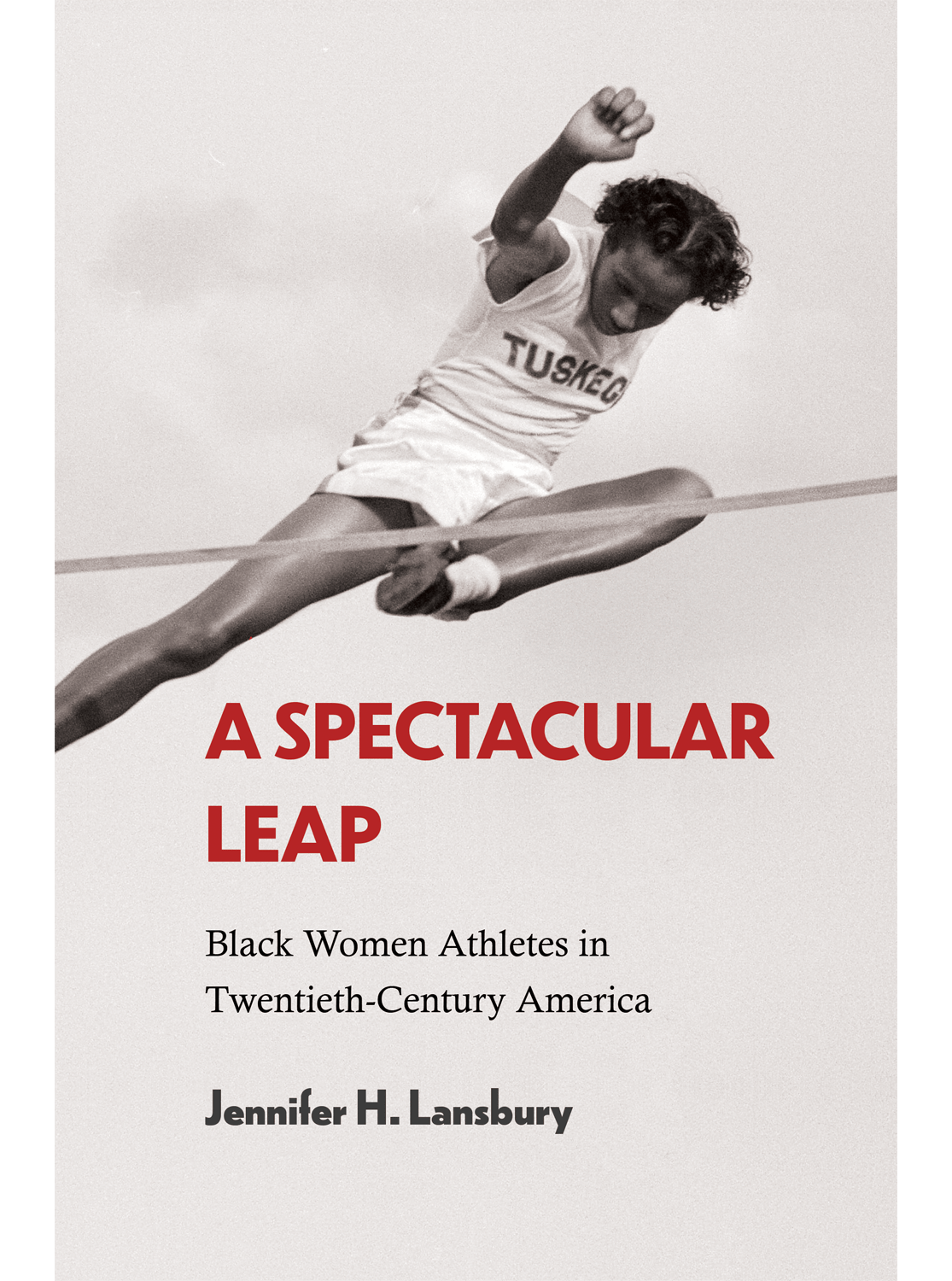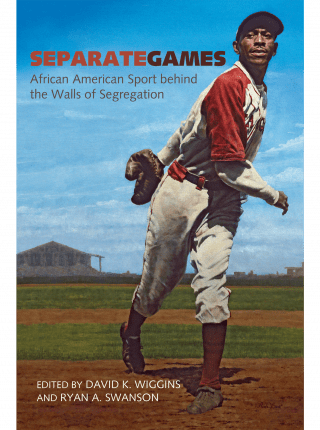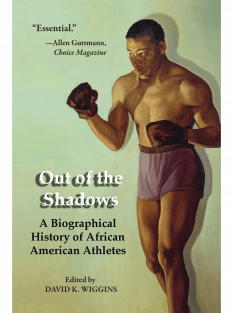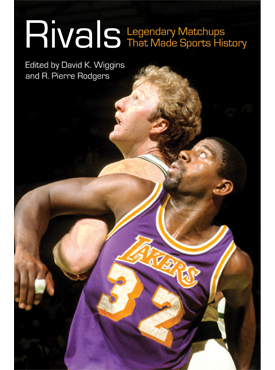When high jumper Alice Coachman won the high jump title at the 1941 national championships with “a spectacular leap,” African American women had been participating in competitive sport for close to twenty-five years. Yet it would be another twenty years before they would experience something akin to the national fame and recognition that African American men had known since the 1930s, the days of Joe Louis and Jesse Owens. From the 1920s, when black women athletes were confined to competing within the black community, through the heady days of the late twentieth century when they ruled the world of women’s track and field, African American women found sport opened the door to a better life. However, they also discovered that success meant challenging perceptions that many Americans—both black and white—held of them.
Through the stories of six athletes—Coachman, Ora Washington, Althea Gibson, Wilma Rudloph, Wyomia Tyus, and Jackie Joyner-Kersee—Jennifer H. Lansbury deftly follows the emergence of black women athletes from the African American community; their confrontations with contemporary attitudes of race, class, and gender; and their encounters with the civil rights movement. Uncovering the various strategies the athletes use to beat back stereotypes, Lansbury explores the fullness of African American women’s relationship with sport in the twentieth century.
Jennifer Lansbury is a twentieth-century American cultural historian. In addition to A Spectacular Leap, she is the author of More Than Words Can Ever Tell.
“Jennifer Lansbury’s A Spectacular Leap is an example of great scholarship … [it] unlocks better understanding of black athletic achievement by illustrating the intersection of gender, race, and class, which is so intertwined that it is often simply conflated and essentialized for African Americans—all African American athletes are male, coming from economic hardship, and are encouraged and respected as men for their athletic dominance. Lansbury offers a kaleidoscopic image of black femininity attuned to the fact that African Americans, currently and historically, are not monolithic: they have lived throughout the country, with distinguishable regional and local peculiarities; they have belonged to all socioeconomic classes; and African American male and female experiences have differed greatly. What stands out most in Lansbury’s work is the collective community action that has been a hallmark of black achievement across time and space, albeit, at times carried out under heavily gender oppressive conditions. … A Spectacular Leap is an insightful, well-researched, and thought-provoking analysis of African American female athletes in the last century and is more than a historical account, as it considers gender, politics, economics, nationalism, activism, and race.”
—Scott N. Brooks, The Journal of African American History, Volume 102, Nos. 1-2
“An important addition to the historiography of women and sport.”
—Amy Essington, The Journal of American History, June 2015
“A Spectacular Leap does an excellent job extending the conversation beyond gender, explaining how race and class intersected in women’s sport history. Sadly, as Lansbury shows with the Williams sisters, black women in sport continue to face stereotypes based on all three social identifiers.”
—Lindsay Parks Pieper, Sport in American History, December 2014
“Jennifer Lansbury brings much needed scholarly attention to the lives of African American women athletes. She has written a compelling, readable narrative that uses biography to illuminate black women’s place in sport history and, more broadly, U.S. history.”
—Susan K. Cahn, author of Coming on Strong: Gender and Sexuality in Twentieth-Century Women’s Sport
Acknowledgments
Introduction
1. Queen of the Courts: Ora Washington and the Emergence of America’s First Black Female Sport Celebrity
2. “The Tuskegee Flash”: Alice Coachman and the Challenges of 1940s U.S. Women’s Track and Field
3. “A Nationwide Community Project”: Althea Gibson, Class, and the Racial Politics of 1950s Black Tennis
4. “Foxes, Not Oxes”: Wilma Rudolph and the De-Marginalization of American Women’s Track and Field
5. “The Swiftie from Tennessee State”: Wyomia Tyus and the Racial Reality of Black Women Track Athletes in the 1960s and 1970s
6. “A Jackie of All Trades”: Jackie Joyner-Kersee and the Challenges of Being the World’s Greatest Female Athlete
EPILOGUE: Performance-Enhanced Athletes and “Ghetto Cinderellas”: Black Women Athletes Enter the Twenty-First Century
Notes
Bibliography
Index

Adopted at: University of Florida
Course: IDS2935 – Special Topics: Why Sports Matter
Course Description: This course examines the long history of professional sports and how athletes maintain the status quo or challenge systemic inequalities.
Professor: David Canton
Term: Fall 2023
Adopted at: University of Virginia
Course: WGS 3240 Gender, Race and Sport: A History of African American Sportswomen
Course Description: Explore the intersection of gender and race in sport, specifically examining the African-American female experience in sport. This course will ask students to consider whether sport was (and continues to be) the great equalizer for both African-American sportsmen and sportswomen, and to evaluate their portrayals (or lack thereof) in both the white and Black media.
Professor: Bonnie Hagerman
Term: Spring 2022
Adopted at: University of Alabama Birmingham
Course: AAS 220 History of Sport: The African American Experience
Course Description: This course provides a socio-cultural and historical overview of the African American athletes that contributed to sports as we know them today. Focus will begin on the historical figures that helped shape sports culture and will continue into discussions about the role African Americans play in collegiate and professionals sports today.
Professor: Addine Clemom
Term: Spring 2021
Adopted at: Southern Methodist University
Course: HIST 3310 Problems in American History: The Black Athlete
Course Description: Explores historical issues or trends in U.S. history using a case study or comparative format.
Professor: Kenneth Hamilton
Term: Spring 2021
Adopted at: University of Kentucky
Course: HIS 360 AAS 360 Race / Sports in America
Course Description: Examines the history of race and sport in America.
Professor: Derrick White
Term: Spring 2021
Adopted at: Lyndon State College
Course: HIS 3155, Sports in American History
Course Description: Analyzes the evolution of American society from the 1830s to the present through the lens of organized professional and amateur athletics. Probes what sports has to teach us about the process of American history in such areas of life as gender, race, ethnicity, local cultures and mass culture, economics, politics, religion, and regional/national identity. Both the experiences of participation and spectatorship will be addressed.
Professor: Paul Searls
Term: Spring 2018
Adopted at: University of Kentucky
Course: History 360 / African American Studies 360, Race and Sports
Course Description: Examines the history of race and sport in America
Professor: Gerald Smith
Term: Spring 2017
Adopted at: University of Pennsylvania
Course: History 231, Race & Ethnicity in Sport
Course Description: Through readings, videos, and discussion, considers the social, cultural, and political relevance of black participation in sport and its larger connection to the evolution of race relations in America.
Professor: Neil Lanctot
Term: Fall 2016
Adopted at: Purdue University
Course: IDIS 371F, The Black Athlete
Course Description: Focuses on specific topics of the personal experiences of blacks, in Africa and the diaspora, including black identity, black culture, and the relationships between blacks and society.
Professor: Andrew McGregor
Term: Fall 2015





